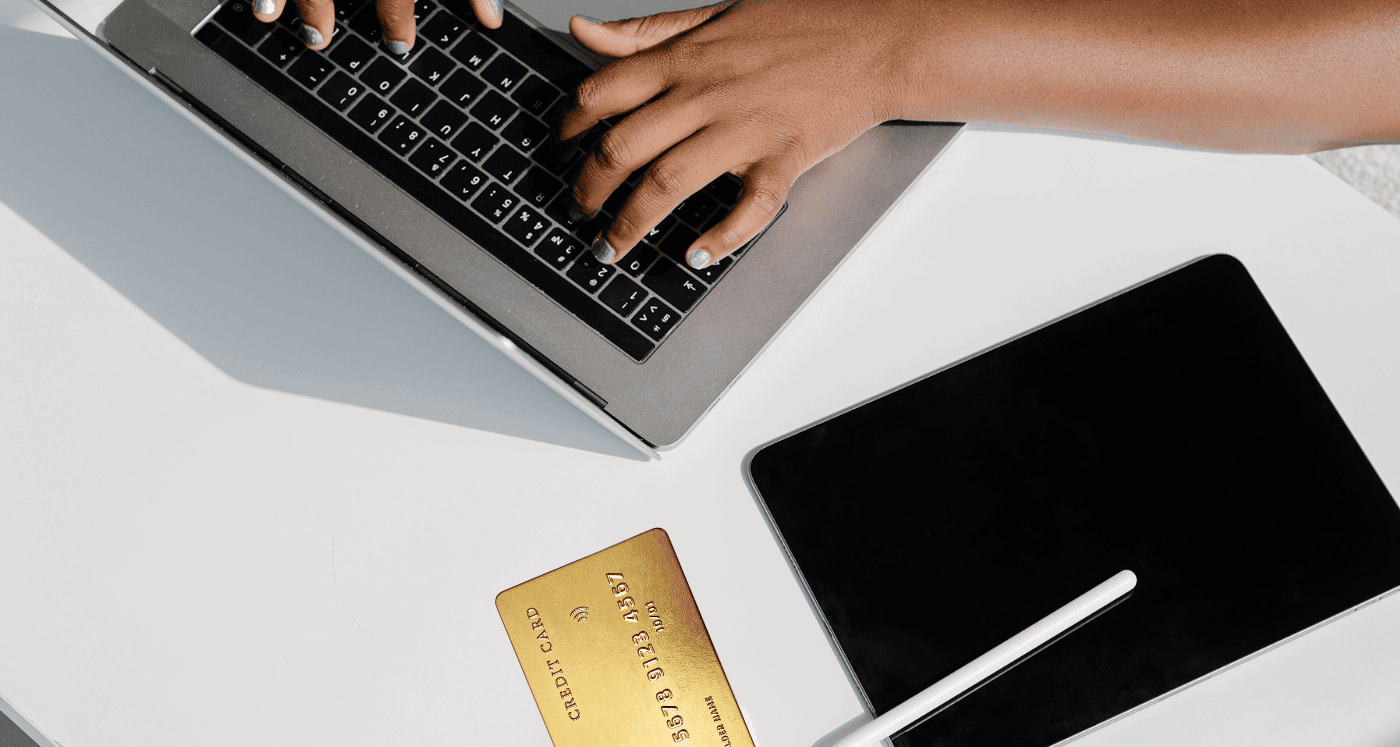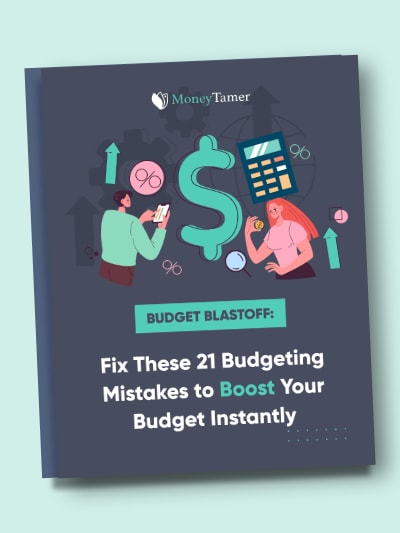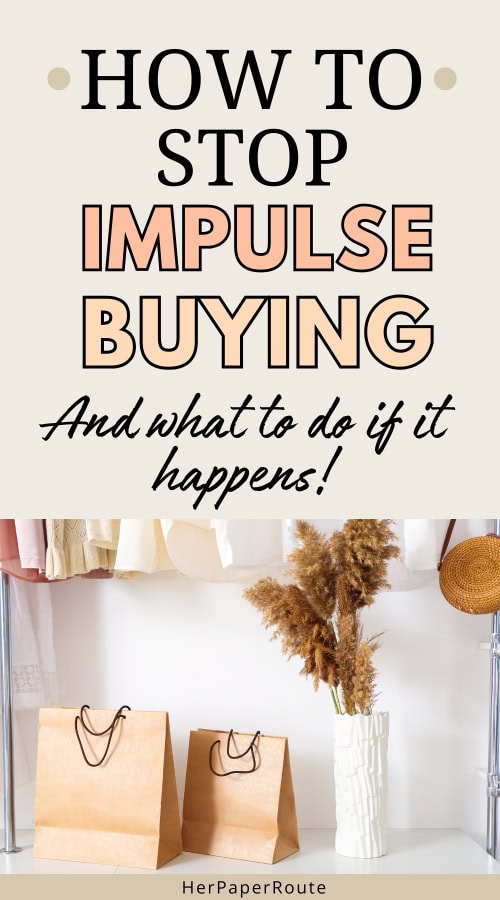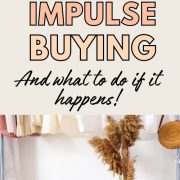What To Do If You Impulse Purchase And (7 Steps To Stop It!)

If you’ve ever been at a store and have been tempted by an end cap of sale goods or grabbed a few lower-priced items near the register, you’ve impulse purchased.
According to Harvard Business School Professor Gerald Zaltman, 95% of our purchase decision-making takes place in our subconscious mind.
As an affiliate partner of various brands and sponsored content, HerPaperRoute may earn commission on qualifying purchases. Disclaimer
Marketers are using this data. They are targeting advertisements and product design to incorporate how the human mind works in order to make their product irresistible.
Don’t think that it’s all out of your control though because it’s not!
Are You Or Your Spouse Spending Out Of Control?
Impulse and emotional spending have a starting point called a trigger. Finding your own personal triggers that cause you to want to spend is necessary for curtailing it.
Impulsive vs Compulsive Buying
Compulsive and impulsive buying triggers have the same end result but very different motivators.
Impulsive spending is unplanned and happens related to an external trigger. Usually a sale or seeing the item in the store.
Compulsive spending is internally motivated. The person shops to ward off feelings such as stress and anxiety.
Compulsive spending can be a lot more detrimental. Over time, this can create a habit that leads to shopping addiction.
Emotional spending is closely related to compulsive spending. Any purchases that involve feelings can end up triggering a loop.
You feel stressed so you spend. Then whenever you feel stressed in the future, you’ll spend to feel better. This won’t help if the root cause of the emotion isn’t resolved.

Are You Sabotaging Your Budget?
See the budgeting mistakes that are holding you back in this FREE Budgeting ebook. Fix these and your budget will blast off!
Why Do People Spend Emotionally?
Habit
Sometimes we do things out of convenience and unknowingly create a habit. For example, if you always get a breakfast sandwich on the way to work.
It may have started out as a once-in-a-while treat. After you do it often enough (about 12 weeks), it creates a habit.
Solution: Try to be more aware of small changes that get incorporated into your day. If you’re running late one day and must buy lunch at work, be
Boredom
Doing the same thing over and over can be repetitive. Whether it’s your work schedule or your daily routine, everyone eventually needs a break.
A quick go-to for filling that time is shopping. Shopping is always different so it is an easy source of entertainment.
Solution: Have a list of go-to boredom-busting activities readily available. If you like Sudoku or word cross puzzles, have a book of them nearby that you can jump into.
Another option is to spend more time learning. Taking rimw to watch videos about a hobby you’ve been meaning to start are ways to keep your mind engaged.
Perceived Value
Clearance racks and internet flash sales are expertly designed to create a sense of urgency. They’re only for a limited time!
This is especially true with online flash sales where there’s a countdown timer or bar showing what percentage of the available items are gone.
Humans perceive the value of goods higher when we think we’re getting a “great deal.” We also are more likely to purchase something if we think other people are buying it too. That lends more credibility to the item being a great price.
Solution: Recognize that an item being on sale doesn’t mean that it’s a good value for you. Yes, the price may be lower and others may be buying it, but if it isn’t something you’d purchase right now at full price then you don’t need it.
Excitement | Thrill Of The Hunt
Purchasing can be a significant mood elevator. Black Friday shopping is a perfect example of this.
People camp outside of a store in the wintertime, often overnight, just to have the chance to buy an item at a discount. Competition is exciting!
Looking at our ancestral roots, we were traditionally hunters and gatherers. In an urban and suburban setting, people live out this “need” through deal hunting and bargain shopping.
Solution: If your main motivator is competition, there are countless other ways to be competitive that’s easier on your pocketbook.
Joining an adult sports league or training for a marathon is a way to use your competitiveness to your advantage.
✅ Tip: Redirect your competitive nature to physical activity. You’ll be healthier burning off a ton more calories AND have a great community of people surrounding you.
Guilt | Obligation
Whenever a Girl Scout shows up at my door, I feel obligated to buy at least one box of cookies for their effort. It’s hard to balance encouraging their entrepreneurial spirit vs not having 20 boxes of cookings hanging around.
School fundraisers are another area where obligation comes into play.
Solution: Set aside a certain amount of discretionary money that can be used for these situations. Once you’ve spent it all, that’s it. There is no more.
Focus on the people you did help with their sales instead of the people you weren’t able to.
Stress | Depression | Sadness
Work stress, depression, and being sad are other common reasons for impulse buying.
Penn State researchers surveyed shoppers and found that retail therapy was good at elevating people’s moods, albeit temporarily.
Solution: Depression should be worked through with your doctor and a therapist to help with the root causes. If feeling stressed and sad are common reasons why you impulse spend, then try to locate what exactly triggers those feelings in the first place.
If your stress is caused by work, try to find ways that you can alleviate some of the issues. Could additional tasks be delegated? Could coworker relationships be improved to cut down on any tension? Perhaps this is a wake-up call to look for another job?
The same steps work for the feeling of sadness. What thoughts are making you feel sad? If you’re lonely, taking small steps to put yourself out there could make a huge difference.
Finding a hobby and joining small meetup groups of people sharing similar interests is great to be around people you have lots to talk about with.
Jealousy | Comparing
Jealousy is definitely the thief of joy. You’re never able to fully appreciate or enjoy what you currently have if you’re constantly looking over at what the person next to you has.
This is also known as “Keeping Up With The Joneses” syndrome. This also is a major factor in lifestyle creep and spending beyond your means.
✅ Tip: Many people who spend their money on outward status symbols are BROKE!
Solution: Now is a great time for some introspection. Why do you feel like you need to show off to others? Working through those thoughts can give you more mental peace since you’re not constantly comparing yourself.
You don’t have to become a minimalist but being content with not having a new luxury car in your driveway and
Celebration | Special Occasions
We all probably have some friends where this is their thing. You go out as a group with the intention of paying for your own food, but your friend inevitably pays for the entire party.
No matter how much you protest or try to give them money, they won’t take it. These people thrive on paying for celebrations.
Solution: If you’re only going out once every few months, this can be easily budgeted for. If you go out weekly, this quickly gets expensive and can plunge you into debt.
Recognizing that this is your impulse buying area can help you set spending caps. Set up a timetable for how frequently and how much your budget allows you to celebratory pay while still hitting all your other financial goals.
Hunger
Mainly in play at the grocery store but could also be applied to convenience store shopping. Hunger makes all food you come across look delicious.
It’s so easy to quickly fill up your shopping cart with snacks and convenience foods you wouldn’t normally buy.
Swinging by convenience stores for huge sodas and bags of chips is another area that hunger drives impulsive buying.
Solution: The easiest solution is to eat before you go grocery shopping. For times when you’re out longer than expected, having a few snacks stashed in your car are great to take the edge off until you can make it to a proper meal.
The Diderot Effect
This refers to the French philosopher, Denis Diderot, who lived his entire life in poverty up until his 50s. Suddenly, he came into money and purchased a scarlet robe.
This was his first misstep. This robe was exquisite but out of place in his life. Thus, it created a spending spiral where he started to acquire additional goods that would fit the life of someone who owned such a robe.
You can see how purchasing one luxury item creates a consumption spiral where you “need” additional items to go along with the first item.
- A new dress needs new shoes and jewelry to go along with it.
- A gym membership requires a wardrobe of stylish workout clothes, new shoes, and a personal trainer.
- Purchasing your child a model train requires you to also get additional tracks and a train table.
Obviously, none of these extras are required but we justify them that way to ourselves to justify the purchases.
Solution: Only purchase items that fit your current lifestyle. Use the workout clothes you currently have or buy a select few tops that complement.
Pick a dress that works with the many pairs of shoes in your closet. Make-do with a smaller train set for your child.
Ways To Stop Impulse Spending
The following steps are behavior-based and set you up for success. Giving yourself permission to spend a certain amount relieves your mind from the famine mindset and makes success easier to achieve.
1) Find Out What Triggers Your Desire To Spend
The first step in controlling impulse spending is to figure out what is triggering it. The easiest way to do this is to keep a tally chart somewhere visible and easy to access.
Every time you feel an urge to spend money, make a tally next to the underlying reason behind it. At the end of the week, you’ll have a very good idea of what situations trigger your impulse spending.
2) Make Your Spending Plan And Stick To It
The purpose of creating a spending plan is to make sure your money is being delegated to where you want it to go. Part of creating a spending plan is to make sure you have some money allowed for general discretionary spending.
Having a certain amount of individual money you can spend on “whatever” is what you agreed to. Keep your promise to yourself and have your long-term goals in mind, and don’t go over the amount.
Related: Get On The Same Financial Page As Your Spouse With This Program
3) Permit Yourself To Spend
What often happens is that after people create a spending plan, they feel guilty about buying things that they want. They feel like they aren’t supposed to buy things and it’s better to save.
This creates an unhealthy restrictive mindset and you’re unlikely to stick with this long term.
Think of it this way: You’ve already allocated money towards savings so that is already covered.
Instead, give yourself permission to spend the money you allotted. That
Related: Get Out Of Debt Fast! Including Making A Spending Plan
4) Do All Shopping With A Plan
Change shopping from a recreational spur-of-the-moment activity to a planned event.
Grocery shop with a list. Don’t go to the outlet stores just because they have sales. Avoid the mall.
Write out a list of items that you’re looking for and consciously vow to only get those items, no matter how great a deal something else is. If it’s not on your list, you don’t need it.
5) Wait 24 Hours Before Big Purchases
It’s easy to get caught up in the moment thinking you’re getting a “good deal.” While buying a $3 lip balm probably doesn’t need the 24-hour rule, larger purchases such as home appliances and cars do.
A good rule of thumb is to wait 24 hours for anything that costs over $100.
Sales professionals are highly skilled at making you think that if you leave you’ll never find a deal as good as what they’re offering you.
Think time-share sales pitches. If they’re so valuable then why is everyone trying to get out of them?
Let me tell you a little secret: There’s ALWAYS another deal!
Unless you’re dealing with antiquities or museum-quality art, chances are you’ll find the same or similar deal in the future.
Waiting 24 hours gives you enough time to get out of that pressure cooker situation. Go home, de-stress, and do some additional research for yourself.
6) Avoid Online Stores And Their Email Lists
Online stores have made it easy to shop 24 hours a day. They allow you to create an account and even store your credit card information for ease of use.
This significantly lowers the friction of a sale. Think of those sites that let you buy items with only a few clicks.
One way to significantly cut down on online shopping is to unsubscribe from all email lists and catalogs. Those emails usually contain information about sales or have coupons included.
Some stores have purchases that go towards accruing points to earn higher discounts. All this does is motivate you to spend more.
By unsubscribing, you’re removing yourself and your email inbox from the constant barrage of sales. These tactics are well studied and expertly part you from your money.
7) Keep Your End Goal In Mind
Having a long-term goal and dream for your life is one of the main topics here at Plantsonify. I’m a strong proponent of setting your goals and having them posted visibly so you’ll see them all the time.
Before you make a purchase, ask yourself if it is supporting that long-term goal or hindering it.
If it doesn’t cover the basic necessities or help you reach your long-term goal, then choose to do without it. You’ll most likely not even remember what the item was a few days from now.
Make Small Steps
The biggest way to get frustrated and give up is to expect an immediate change. Dealing with the underlying root causes of impulse spending requires a lot of introspection and self-awareness.
How To Stop To Spending Money And Cull The Desire To Impulse Purchase – Conclusion
Working through your spending triggers will take time and commitment. Know that you aren’t alone and that it’s okay to have setbacks.
You took the first and biggest step by realizing there is a problem. Work through the impulse spending triggers
So take as much time as you need and do small steps on your path to financial freedom!
Did you follow any of the steps? Do you have other ideas on how to avoid impulse spending? Share them in the comments below!
Related Articles:

Follow along on Instagram!









![Why Is My Debit Card Declined? [Plus, How to Fix Deactivation] 11 Woman checking her phone to see that her debit was declined and asks Why Is My Debit Card Declined](https://herpaperroute.com/wp-content/uploads/2022/04/Why-Is-My-Debit-Card-Declined-768x410.jpeg)

